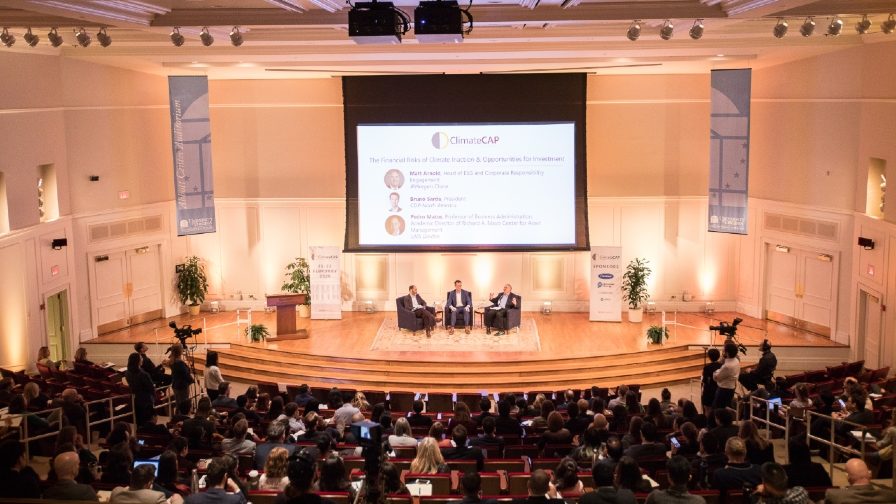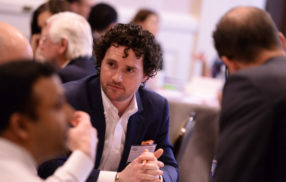
MBA Climate Summit: Embracing Opportunities, Mitigating Challenges
By Dave Hendrick
Understanding the challenges and opportunities presented by global climate change linked the speakers, presentations and dialogues at ClimateCAP: The Global MBA Summit on Climate, Capital & Business, held 21–22 February at the University of Virginia Darden School of Business.
Organized by Darden’s Batten Institute for Entrepreneurship and Innovation, with financial support from Carrier Corp., Dominion Energy, Corning and Apex Clean Energy, the event drew more than 170 MBA students from 24 different business schools as well as many Darden alumni and professors.
ClimateCAP organizers billed the annual event as a platform to discuss what every MBA student needs to know about the business implications of climate change and the evolving role and responsibility of business in tackling the 21st century’s most urgent issue.
“Business is not the solution,” said Duke Professor Dan Vermeer, ClimateCAP co-founder, “but there is no solution that happens without business.”
e-Commerce Megatrend Puts Pressure on Carbon Footprint of Global Shipping Industry
Chief Strategy and Transformation Officer Scott Price (MBA/MA ’90), who sat for a fireside chat with Professor Mike Lenox, head of Darden’s Business Innovation and Climate Change Initiative, at the ClimateCAP summit, detailed the challenges of sustainability issues for a global shipping company.
Price said the entire shipping industry is on the cusp of massive growth as the “global megatrend” of e-commerce continues to gain steam. He expects e-commerce to drive the total U.S. market for package delivery from 54 million packages per day to 122 million packages per day in the coming years.
That projected market growth is a great business opportunity but a big carbon footprint problem.
“Everyone in this room wants that box outside their door,” Price said. “In the past, a person went out and bought 14 to 16 items in one trip. Now, those things are ordered and it takes many trips to deliver them. Grubhub, Uber Eats — all of those things that give people convenience, there is not yet accountability for their carbon footprint.”
Price said UPS is racing to trim its carbon intensity, including commitments to transition a quarter of its fleet to all-electric vehicles; enhance the use of dynamic routing, which already saved 100 million miles and 100 million metric tons of greenhouse gas emissions last year due to more efficient routes; greater electrification of the “last mile” in package delivery; more efficient charging hardware as its electrification efforts grow; greater use of renewable energy to fuel its electric fleet; and increased automation in the delivery process to increase overall efficiency.
Price said one of the most important nuts the company must crack to reduce its carbon footprint goes back to recreating the old days of consumers getting more packages in fewer trips. The company — and many others — are working together to create “synthetic density” in package delivery. For example, consumers may choose one day a week to receive packages.
Price said UPS’ goal is to increase delivery density to four or five packages per location, which would net a major carbon footprint improvement from about 1.2 packages per location today.
Forging a Career With a Sustainability Focus
Executives from companies ranging from JPMorgan Chase to Walmart said a career path marked with a sustainability focus came with significant tailwinds and the ability to make an outsized impact as a new hire at a large organization.
JPMorgan Head of ESG and Corporate Responsibility Engagement Matthew Arnold said the interest in ESG investment has exploded recently, noting what he termed a “sea change” in the embrace and understanding of sustainability issues throughout the investment community.
Two days after Arnold spoke at ClimateCAP, JPMorgan announced plans to cease financing activities of coal companies and drilling activities in the arctic.
“For an MBA, there is an increasingly rich series of pathways [around ESG],” said Arnold, who at one point worked for Greenpeace before entering the business world.
Taking a keen interest in ESG issues is also a surefire way to stand out in a crowd at a large company, Arnold said.
“Senior management will know you way before they would have, had you gone through a traditional path,” Arnold said. “It changes your career path. It accelerates it.”
To influence change at large organizations, Arnold advised those in the sustainability realm, particularly relatively junior employees, need to always ensure they are making the business case for climate action.
“The story is: why is this a better future for the organization than the alternative,” said Arnold. “Investors care about growth and margins. Those two things drive returns. If you don’t frame it as a growth and margin story, it’s not interesting to investors.”
Advocating and Advancing Change in Large Organizations
A panel of Darden alumni shared advice on seeking to advance the sustainability conversation from within large organizations.
Those in sustainability roles often have leeway to blaze a path, panelists said, but new hires would be wise to ensure that they develop functional expertise in service to overall business goals.
Chrissa Pagitsas (MBA ’09), vice president of enterprise environmental, social and governance at Fannie Mae, noted that when she started at the mortgage giant in 2010, climate change and sustainability concerns were not front and center, and yet there was an opportunity to work on issues related to helping homeowners stay in their homes by reducing energy costs.
“Keep top of mind that what actually drives the business is going to be the business product, said Pagitsas. “It’s not likely going to be sustainability.”
Pagitsas subsequently helped Fannie Mae become a leading provider of green bonds.
Will Teichman (MBA ’09), vice president of business operations at Kimco Realty Corp., traced an arc at Kimco of sustainability initiatives that began from a defensive position — essentially seeking to respond to critics regarding a lack of sufficient ESG initiatives — to one woven throughout core business strategies.
“We needed to build the business case about mitigating that downside risk,” Teichman said. Within a large company, instilling a sustainability focus is often about figuring out how to influence the right people to ensure sustainability issues are on the agenda, Teichman said.
Katherine Neebe (MBA ’04) senior director of ESG, trust and transparency at Walmart, said the sustainability conversation at companies is changing rapidly, in part due to the urgency of the challenge facing the word.
“In 2000, climate change was a distant challenge. It’s here today. Ecosystem collapse is a problem of today and the role of companies is fundamentally different,” said Neebe. “Companies are now being asked to step in where regulation is failing and that’s a new and uncomfortable place for companies to be.”
Standardization of Disclosures and a Shared Language of Accounting: Key Tools for Business Action
Moody’s Chief Financial Officer Mark Kaye and Brad Sparks, U.S. director of The Prince of Wales’ Accounting for Sustainability Project’s U.S. CFO Leadership Network, spoke on a panel with Professor Ed Freeman on how finance departments can be empowered to use their tools and skills to catalyze climate action.
Kaye confirmed the rapidly growing trend of companies accepting the financial risks inherent in ESG issues, but said CFOs are still facing a “Wild West” when it comes to how to disclose and quantify climate-related risks and business action to reduce risks.
The two men lobbied for a continued effort for business to create a common language to account for climate risks and actions, as well as standards for financial disclosures related to those issues. With such progress, they said businesses and markets will be better able to benchmark and spur meaningful change.
CDP North America President Bruno Sarda discussed the financial risks of climate inaction and opportunity for investment. The company runs what Sarda described as a global environmental disclosure system, scoring cities and companies on metrics of environmental performance and risk. The goals of such transparency are not only to breed more sustainable actions, but also meet the need for climate risk to be visible to the investment community.
Currently, less than half of North American companies quantify their financial risk related to climate issues, Sarda said.
“Companies not disclosing [their climate impact] are running out of reasons why, and investors are losing patience,” said Sarda.
More than 2,000 companies disclose environmental performance to CDP, which then rates them on environmental transparency and performance in the categories of climate change, forests and water security. A single company, HP Inc., has an A rating in all three categories.
Echoing a recurring theme of the summit, Sarda said companies that are serious about climate action are both generally outperforming the markets and hold a competitive advantage. He put the near-term market opportunity for low-carbon, water-secure innovations at more than $1 trillion.
The risks of inaction are great, Sarda said. So too, however, are the rewards.
Pledging to Be an Agent for Change
One concrete method to take the ambition and ideas at ClimateCAP into business leadership came via the ClimateVoice pledge, a new initiative announced at the conference.
Citing the precedent set by corporate- and employee-driven societal progress on issues such as marriage equality, ClimateVoice founder Bill Weihl detailed a vision of companies moving from being “bystanders to upstanders” on issues of climate.
“Simply being a good corporate citizen on issues of sustainability is not a sufficiently urgent approach,” said Weihl, the former director of sustainability at Facebook. Corporations instead must use their enormous influence to actively influence public policy around climate issues. “Employees demanding more from the corporations where they work will help to move the needle on climate change action, said Weihl.
Those who sign the ClimateVoice pledge promise to work at companies that prioritize climate issues and to stress to current and prospective employers the importance of action.
“We want to mobilize the voices of thousands of students and employees to tell them that now is the time to go all-in on climate,” said Weihl.
Feeding a Growing Planet Responsibly
Wendy Srnic, global leader of integrated field sciences at agriculture technology company Corteva Agriscience, emphasized the unique opportunity and timing for MBAs, especially those with science degrees, to help sectors like agriculture expand while taking into account climate challenges.
“Over the next 30 years, we will add more than 2 billion people to this planet” Srnic said.
She added that farmers will need to produce more food in the next 30–40 years than we’ve produced as humans in the last 10,000 years, all while the climate is changing. This will require significant innovation not only in the products and technologies to support agriculture, she said, but also in how food is distributed through the supply chain.
To learn more about Darden research on business innovation and climate change visit: https://www.darden.virginia.edu/innovation-climate. To find out about upcoming ClimateCAP events in the U.S. and globally, visit: https://www.climatecapsummit.org/
The University of Virginia Darden School of Business prepares responsible global leaders through unparalleled transformational learning experiences. Darden’s graduate degree programs (MBA, MSBA and Ph.D.) and Executive Education & Lifelong Learning programs offered by the Darden School Foundation set the stage for a lifetime of career advancement and impact. Darden’s top-ranked faculty, renowned for teaching excellence, inspires and shapes modern business leadership worldwide through research, thought leadership and business publishing. Darden has Grounds in Charlottesville, Virginia, and the Washington, D.C., area and a global community that includes 18,000 alumni in 90 countries. Darden was established in 1955 at the University of Virginia, a top public university founded by Thomas Jefferson in 1819 in Charlottesville, Virginia.
Press Contact
Molly Mitchell
Senior Associate Director, Editorial and Media Relations
Darden School of Business
University of Virginia
MitchellM@darden.virginia.edu







